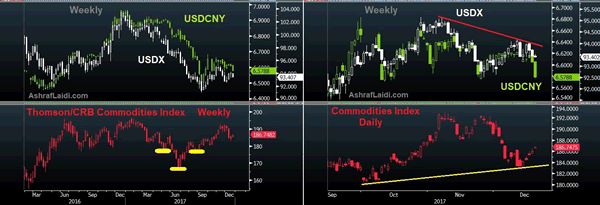They say never bet against the Fed. The institution, which for the last 8 years, has overestimated GDP growth and more importantly, predicted more rate hikes over the last 3 years than it ended up delivering, to the chagrin of USD bulls. But what about China? Those who bet against it since the 2015 market correction, have paid a heavy price. State and provincial debt continues to grow, but its currency has firmed and its capital markets have held up. So what to make of this week’s announcement of economic blueprint in Beijing?
Turning on the Taps?
China’s Central Economic Work Conference takes place this week, unveiling what could be a critical set of announcements for global risk appetite, indices and world growth. After embarking on a multi-year effort to curb debt, China is no longer expected to focus on reign in borrowing. A WSJ report indicated that Beijing will instead try to slow the pace of debt growth rather than cut leverage.
With debt reduction no longer a key focus and inflation low, China may once again attempt to boost growth, especially private growth. Could China’s stock markets see a further resurgence next year, and spill over into commodities and broader emerging markets?
Outperforming before MSCI inclusion
China’s growing significance among portfolio managers’ stock pickings was manifested over the summer by Morgan Stanley’s announcement to include over 200 Chinese stocks in its MSCI Emerging Market Index starting May and August of next year. MS decision to include U.S.-listed Chinese American Depositary Receipts (ADRs) has pushed China’s share allocation in its EM index to 26.5%, and will further increase to 32% once the +200 mainland shares are included.
Intermarket Implications
Whether the “buy China + EM” move has already happened and any joiners on the move may be too late is serious question to consider. Most EM equity indices are up +20% this year, while the US-based ETF of Chinese shares is up 50%.
The charts below highlight the strong positive correlation between the US dollar index (57% of which is tied to EURUSD) and the USD/CNY exchange rate. With USDX consistently failing to regain 94.00 (right shoulder resistance), USD/CNY unable to break above 6.70 (55-WMA) and commodities holding above 177, the path of least resistance for this intermarket dynamic remains supportive of metals in particular and commodities in general. And for the latest look on gold’s post-Fed move, here our latest video.

